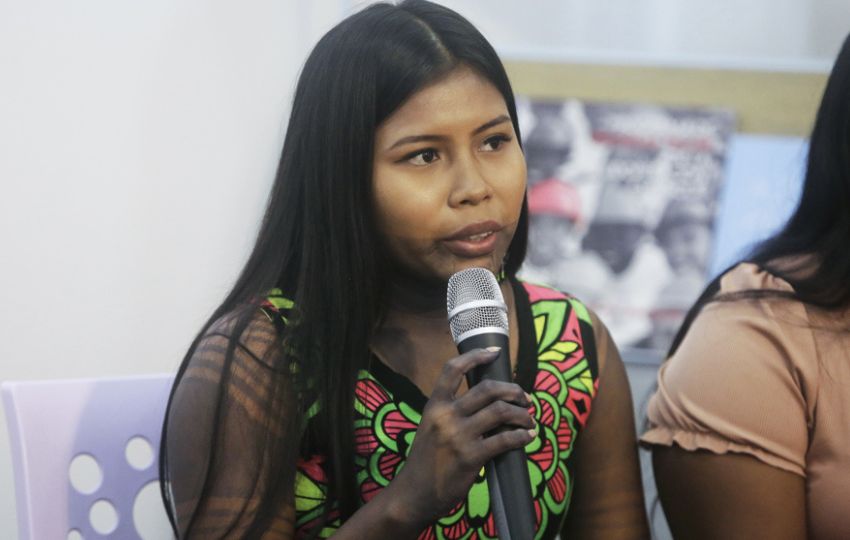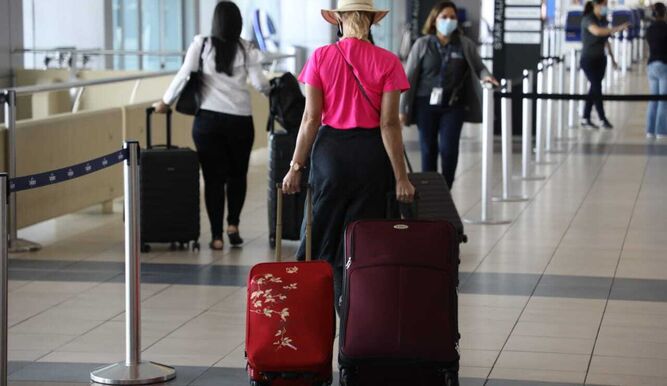Panama Indigenous Women Campaign Seeks to Raise Awareness about Their Right to Health
This campaign is part of a project to strengthen access to health services for the population of the Emberá-Wounaan communities. A member of the Embera ethnic group, Chelin Chami, pictured below.

The “My Health, My Body, My Right” campaign launched this Monday in Panama seeks to raise awareness among Indigenous women about their right to health within deeply patriarchal communities where they lack a voice, informing them about issues such as family planning, menstrual hygiene, and the right to receive health care. This campaign, launched by the HIAS organization with the support of Spanish Cooperation, is part of a project to strengthen access to health services for the population of the Emberá-Wounaan communities, which aims to “raise awareness on the one hand, but also provide all the necessary information, especially to women and adolescents, so they know how to access these rights.”
“The right to family planning, the right to health care, including mental health, information on menstrual hygiene, but it’s also important because it’s information aimed at men. These are structures that are still commonly led by men, so there’s a stigma when talking about sexual and reproductive health,” HIAS’s country director in Panama, Oliver Bush, explained to the news media. Furthermore, he adds, these are very remote indigenous communities, located near the Darien jungle, close to the border with Colombia. Therefore, the campaign also seeks to provide information, in coordination with local authorities, on how to access these health services, seeking to ensure that, by strengthening institutions, “it remains over time.”
An opinion shared by Itziar González, general coordinator of Spanish Cooperation in Panama. “It’s about having healthy communities. Without health, communities can’t work; they can’t live a dignified life. It’s also about emphasizing the issue of sexual and reproductive rights, because we know that unwanted pregnancies, early pregnancies, are always a hindrance, especially to the development of women and girls, to their ability to continue their education, to their ability to have a better life,” she explained to news reporters. Thus, the goal is to “work together in a culturally respectful manner with the communities and in a way that involves national authorities to try to improve access to health and sexual and reproductive health for these communities,” González explained.
Voiceless
Several Indigenous women beneficiaries of the program participated in the campaign launch event, held at the Spanish Cultural Center in the Panamanian capital. Among them was young Chelin Chami, from the indigenous village of Bajo Chiquito, who told reporters that in her culture the treatment of women is “very harsh, very strong,” where they have “no voice or vote anywhere.” However, she clarified that during the awareness workshops given by HIAS they learned that they have rights, a lesson she passed on to her mother, who tended to think according to the predominant masculine discourse.
“We gave our opinion and it wasn’t listened to, women could only have children. I mean, they were just for procreating. Now, as times have changed, we have the right to give our opinion on whether or not we want to have children,” she stressed, that is, “with our bodies we can do what we want, without other people telling us what to do.” The “nocó,” or traditional leader of Bajo Chiquito, Esmeralda Dumasá, was emphatic in explaining that this situation must end, including the worst cases of sexual abuse within the family, in which learning how to report abuse and psychological support are necessary.
“We were raped, we kept quiet out of shame, but now we’ve learned that we have support at HIAS, and we want to say that we need that space with a psychologist. These rapes were carried out by our own family members. That made us commit suicide,” Dumasá told reporters. And the fact is, “there are many voices that silently cried out, and today we are a living example, standing here saying that abuse can no longer exist, violence can no longer exist, and that we are empowered women,” she stated.





